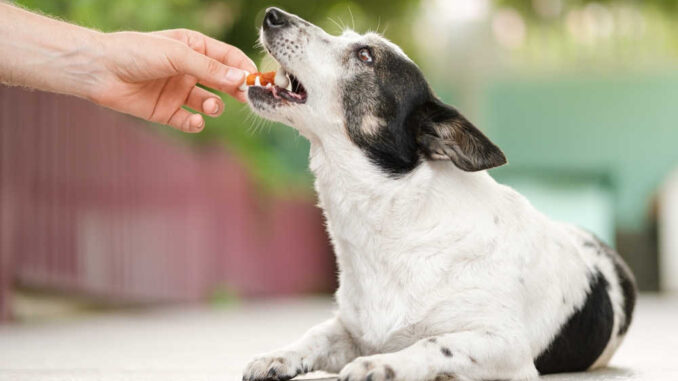
As pet parents, it’s important that we keep a close eye on our pet’s health. While scooping poop may be one of the more unpleasant tasks that come with being a responsible dog owner, monitoring your dog’s stool can actually provide vital information on their overall health and well-being. Changes in color, consistency, or the presence of blood or mucus can serve as an indicator of potential health issues. Let’s explore possible causes of mucus in your dog’s stool, when to seek veterinary care, and home remedies to try.
What is mucus in dogs’ stools?
Mucus is a slippery substance that lines many parts of the body, including the intestines, to protect and lubricate them. In dogs, a certain amount of mucus in the stool is normal and is usually not noticeable; however, if you’re seeing a large amount of mucus coating your dog’s stool or mucus being passed separately from stool, it may be a sign of a health issue such as inflammation of the colon or rectum known as colitis.
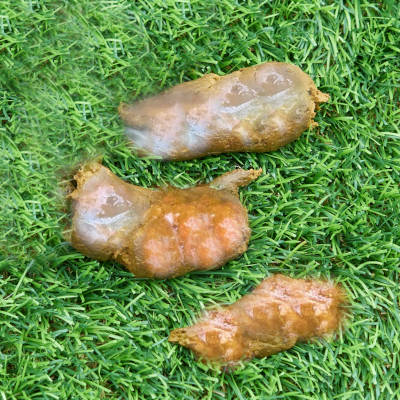
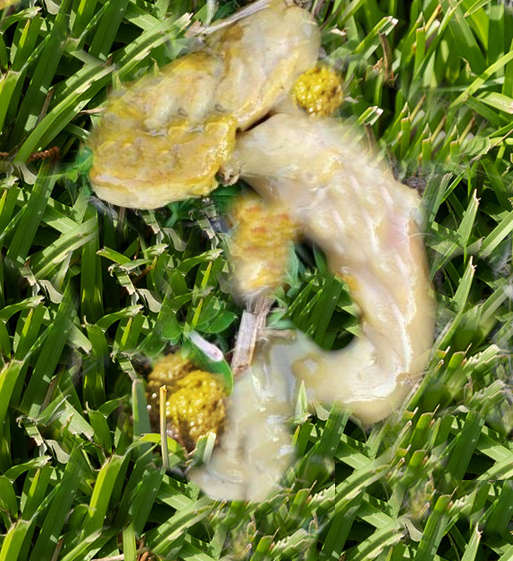
This can be due to a variety of causes, such as dietary change, food intolerance, infection, parasites, inflammatory bowel disease, cancer, or even stress. Often times excess mucus in a dog’s stool is accompanied by soft stools or diarrhea.
What are the causes of mucus in dogs’ stools?
1. Dietary indiscretion or food intolerance
Dietary indiscretion (if your dog eats something they shouldn’t) is a major cause of gastrointestinal upset and colitis. While this is typically self-limiting and may resolve with the home remedies discussed, it is important to note that certain foods and items are toxic to dogs if ingested. Additionally, if something becomes lodged in the intestinal tract it can cause a life-threatening obstruction requiring emergency surgery.
Abrupt changes in a dog’s diet can upset their digestive system, leading to mucus in the stool. This is particularly common when introducing a new type of food. It’s always best to make dietary changes gradually to give your dog’s system time to adjust.
Just like humans, dogs can be intolerant or allergic to certain foods. This intolerance can irritate the digestive tract, leading to mucus in the stool. If your vet suspects this, they may recommend a diet trial with a prescription hydrolyzed protein food. Other common signs of food allergies in dogs include itchy skin, hair loss, and recurrent skin and ear infections.
2. Parasites
Dogs, especially puppies, are susceptible to a variety of parasitic infections. Worms or parasites like giardia can cause mucus in the stool, along with other symptoms such as diarrhea and vomiting. Your vet will want to run a fecal sample to check for the presence of parasite eggs and can then prescribe an appropriate dewormer.
3. Infection
Infections in the digestive tract caused by harmful bacteria, such as Salmonella or E coli, can cause changes to your dog’s stools. Dogs who eat a raw diet are at higher risk of encountering these pathogens. Disease can become severe and requires veterinary testing and treatment.
4. Inflammatory bowel disease
This condition is characterized by chronic inflammation of the dog’s gut. Along with mucus in the stool, other symptoms might include weight loss, vomiting, and diarrhea. Your vet may recommend a full workup, including imaging, bloodwork, and biopsies to help diagnose this condition. There is no cure for IBD, but it can be managed with diet and medications.
5. Stress
When dogs experience stress it can manifest physically. A stressed dog may have soft stool containing mucus and may display other behavioral changes. Stress colitis is often seen in dogs who are boarding, move houses, or when a new baby or furry family member joins the family. It will usually resolve with a bland diet. In some cases, anxiety medications may be beneficial.
6. Cancer
In some cases, cancer can cause diarrhea containing mucus and/or blood. In order to diagnose cancer, your vet will need to perform bloodwork, imaging, and biopsies.
Home remedies for dog with mucus in stools
While mucus in the stool isn’t necessarily a cause for alarm, persistent mucus or other accompanying symptoms might point to some underlying issues requiring veterinary attention. If your dog continues to have a normal appetite and energy level, and their only symptom is mucus with or without loose stools, these home remedies may be helpful.
1. Monitor bowel movements
If you notice mucus in your dog’s stool, continue to monitor your dog’s bowel movements and keep an eye on what they are eating. Also, watch for any other clinical signs, such as diarrhea, bloody stool, vomiting, loss of appetite, lethargy, pale gums, or weight loss.
2. Offer a bland diet
Mild GI upset often responds to a bland diet. You can purchase a prescription bland diet from your vet or make your own such as plain boiled skinless boneless chicken and rice. See our recommended recipes here. It is recommended to feed a bland diet for a couple of days, then gradually return to your pup’s normal kibble.
3. Add a probiotic to the diet
Probiotics, such as Fortiflora, can help restore the normal/good bacteria in your dog’s GI tract, help promote GI health, and aid in the treatment of mild GI upset.
4. Add fiber to the diet
Fiber can help firm and bulk up your dog’s stool, as well as promote GI health. There are several possible sources of fiber that can be added to your dog’s diet. Your vet will be able to recommend a high-fiber diet or supplement. Plain canned pumpkin (not pumpkin pie filling, which contains sugar) can also be added to your dog’s diet at the starting dosages listed below, then increased slowly to effect.
- 1 tablespoon per meal for large dogs
- 1-2 teaspoons per meal for small or medium dogs
5. Keep your pup well hydrated
Make sure that your pup has access to fresh water. You may encourage drinking by adding a small amount of low-sodium chicken broth to their water or offering a canned bland diet to up their water intake.
6. Use year-round flea, heartworm, and parasite prevention
Intestinal parasites are a potential cause of changes in stool consistency. The best way to prevent parasites is to use a monthly preventative year-round. There are many options available, and your vet can help recommend one that may be best for your dog’s lifestyle.
7. Feed an AAFCO-approved nutritionally balanced diet (and avoid raw diets)
Feeding a nutritionally balanced diet is key for keeping your pup happy and healthy. Raw diets come with increased risks of infection and parasites, and are generally not recommended. If your dog has a food intolerance or allergy, they may need to eat a prescription limited or hydrolyzed protein diet.
When home remedies are not enough
If your dog’s stool continues to contain excess mucus for more than a week, you should schedule an appointment with your vet. You will need to see your vet sooner if they are experiencing other clinical signs such as:
- Soft stools or diarrhea that is not responsive to home remedies. Diarrhea is often accompanied by an increased urgency to defecate, increased frequency of defecation, accidents in the house, or straining to defecate.
- Bloody stools (either black or red)
- Abdominal pain
- Vomiting
- Decreased appetite
- Decreased energy level
- Pale gums
- Collapse
When you see a vet for mucus in your dog’s stool they will start with a thorough history and physical exam. Additional recommended testing may include fecal testing for parasites or infection, bloodwork, and imaging of your dog’s abdomen. Treatment will depend on the underlying cause and may often involve diet changes or medications. In severe cases, hospitalization or surgery may be necessary.
Frequently Asked Questions
How long should I try home remedies before seeking veterinary assistance?
A lot will depend on your dog, if they have any other clinical signs of illness, and their comfort level. If your dog has mucus in their stool but no other clinical signs of illness, you could monitor and try home remedies for up to a week. If diarrhea is not responsive to home remedies after a couple of days it is best to schedule an appointment with your vet. If your dog has other clinical signs, such as vomiting, lethargy, or loss of appetite, you should see a vet as soon as possible.
Can home remedies cure the underlying cause of mucus in stools?
The home remedies discussed above may help relieve symptoms of mild GI upset. In some cases, such as stress or dietary indiscretion, this may be all that is needed for your pup’s stools to return to normal. If your dog has an underlying medical issue, such as parasites, infection, or cancer, they will require veterinary diagnostics and treatments.
Can I use multiple home remedies together?
The home remedies listed in this article can all be used together and are extremely safe. Remember to never give your pup human medications.
Disclaimer: This website's content is not a substitute for veterinary care. Always consult with your veterinarian for healthcare decisions. Read More.



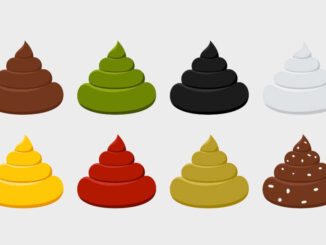
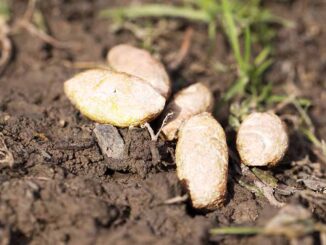
Be the first to comment